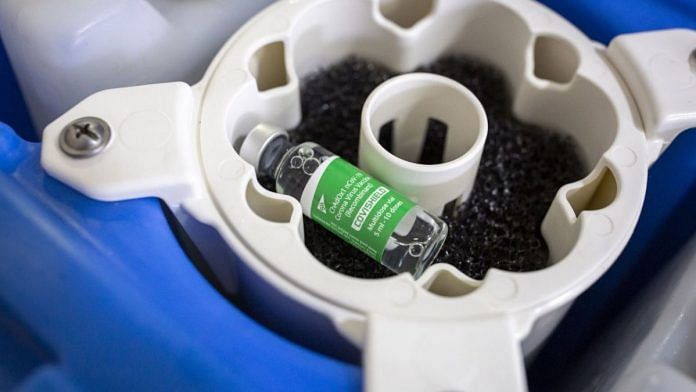New Delhi: Whether rare blood clots have formed after vaccination with the AstraZeneca vaccine — known as Covishield in India — becomes apparent within 5 to 20 days, and the widely available ELISA tests can be used to check if a person is at risk of such life-threatening blood clots, a new study suggests.
A team from the Universitätsmedizin Greifswald (Greifswald University Hospital) and Federal Institute for Vaccines and Biomedicines in Germany, along with researchers from the Medical University of Vienna, examined rare cases of unusual blood clots in people who received the AstraZeneca vaccine.
In their study published in the New England Journal of Medicine, the researchers examined 11 patients in Germany and Austria who had developed rare blood clots after vaccination.
The patients had developed blood clots in the brain, veins, lungs and stomach. Six of them died.
Along with this, 28 others submitted blood samples that were tested by the team to look for vaccine related blood-clot events.
The researchers found that the blood clots in vaccinated people are similar to what is known as heparin-induced thrombocytopenia.
Heparin is an injectable blood thinner that is used to treat and prevent blood clots. The drug, however, can decrease platelet levels leading to formation of blood clots in the veins several weeks after a patient stops taking the drug. This is known as heparin-induced thrombocytopenia.
The team found that none of the patients in the study had been receiving any heparin to explain the subsequent development of unusual blood clots after vaccination.
Researchers suggest that interactions between the vaccine and platelets in the blood or a protein known as PF4 could play a role in the formation of blood clots, although adding that this requires further study.
The study says the free DNA, that is fragments of genetic material, in the vaccine could be a trigger for the process that causes such blood clots to form. Previous studies have shown that free DNA or RNA can induce the formation of PF4–heparin complex, which plays a key role in heparin-induced thrombocytopenia.
Also read: Modi govt policy not effective enough, Covid vaccine must be free for all, ICMR researchers say
‘Use ELISA test to detect clot’
The researchers recommend the use of ELISA tests (a type of antibody test) to detect antibodies against PF4-heparin and investigate patients for potential post-vaccination blood clots.
If a person gets a strongly positive ELISA result but has not been recently exposed to heparin, it would be a striking abnormality, the researchers say.
The findings are important for India as more than 19 crore doses of the vaccine (including both first and second shots) have been administered in the country, according to the data available on the CoWIN website.
Although such cases are rare, doctors need to remain on the lookout for symptoms of such blood clots in patients in order to intervene quickly and treat patients before the condition turns fatal.
To date, this reaction has been reported only with the AstraZeneca vaccine, researchers wrote in their study.
While there have been several reports of patients developing blood clots after taking the Johnson & Johnson AD26.CoV2.S vaccine, a study published in the NEJM Tuesday of 2,88,368 health care workers in South Africa showed that these blood clot events were not linked to the vaccine.
Of 2,88,368 health care workers, just 2 per cent experienced adverse events after the vaccine. Fifty health care workers had adverse events that met the criteria of being serious or of special interest. All the five health care workers who developed blood clots after vaccination had pre-existing health conditions that put them at risk of blood clots.
The researchers concluded that these blood clots were not induced by the J&J vaccine.
(Edited by Arun Prashanth)
Also read: Gender gap in vaccine worse than India’s sex ratio: Only 867 women got Covid shot per 1,000 men



